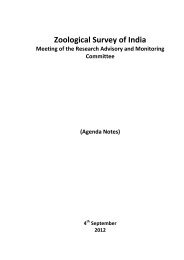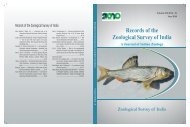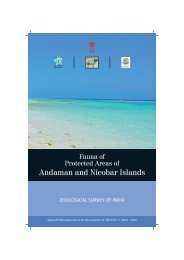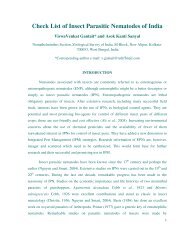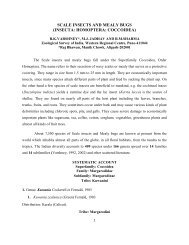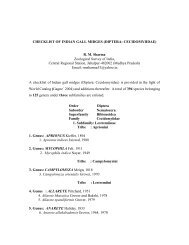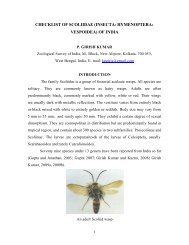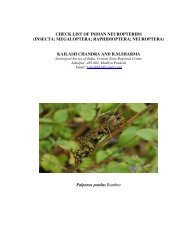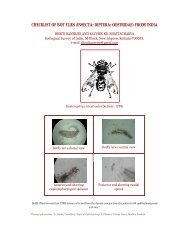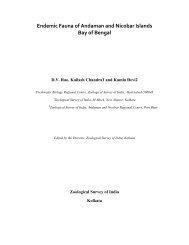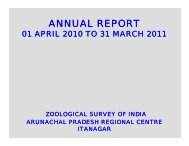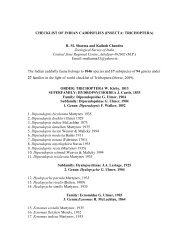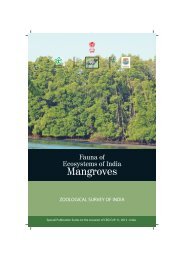Vol. 111 - Part I - Zoological Survey of India
Vol. 111 - Part I - Zoological Survey of India
Vol. 111 - Part I - Zoological Survey of India
You also want an ePaper? Increase the reach of your titles
YUMPU automatically turns print PDFs into web optimized ePapers that Google loves.
44 Rec. zool. Surv. <strong>India</strong><br />
population <strong>of</strong> jackals may be grouped in to<br />
approximately seven-to-eight loose family groups. Most<br />
<strong>of</strong> them are confined to southern part <strong>of</strong> the club, except<br />
two groups roaming in the northern part. In a natural<br />
environment the hunting families hold territories <strong>of</strong> two<br />
to three square kilometers throughout the year, portions<br />
<strong>of</strong> which are marked with urine, either by the male or<br />
the female jackal, to ward <strong>of</strong>f intruders. However, the<br />
study area (Tollygunge club), which is an artificial<br />
environment, with an area <strong>of</strong> only 100 hact. (1 sq km.)<br />
and holding a handsome, healthy and breeding<br />
population <strong>of</strong> jackals is an indication that carrying<br />
capacity <strong>of</strong> club is still in favor <strong>of</strong> jackals especially<br />
when no fighting were observed for defending the<br />
territory. But such incidents have been reported by local<br />
staff during breeding period.<br />
In the wild both male and female members <strong>of</strong> a<br />
golden jackal pair have important roles in maintaining<br />
their territory and in raising the young. When one parent<br />
dies, it is unlikely that the rest <strong>of</strong> the family will survive<br />
(Moehlman, 1983). Members <strong>of</strong> the same family also<br />
cooperate in sharing larger food items and transport<br />
food in their stomachs for later regurgitation to pups<br />
or to a lactating mother.<br />
As far as their reproductive success is concerned<br />
there are records <strong>of</strong> six pups in 2007 and three pups in<br />
early 2008 as reported by Dr. Ghosh (unpublished<br />
report) and two pups in Dec., 2008 during our study.<br />
These reporting indicate that the jackals are<br />
continuously and successfully breeding in the Club. It<br />
is known that once the population <strong>of</strong> the canids’<br />
reaches to its saturation i.e. carrying capacity, they<br />
control their own number (unpublished report by Dr.<br />
Ghosh), therefore, we can conclude that the jackal<br />
population <strong>of</strong> the Club is yet to reach its point <strong>of</strong><br />
saturation.<br />
The jackals are known to consume approximately<br />
54% animal food and 46% plant food with a very varied<br />
diet (Animal Diversity Web). This is one <strong>of</strong> the<br />
important habits that are contributing to their<br />
successful survival in spite <strong>of</strong> various actions taken<br />
by the Club Authorities to see that Club refuge is not<br />
accessible to jackals. The findings <strong>of</strong> another study<br />
conducted in agro-ecosystem <strong>of</strong> Bangladesh also<br />
indicate that rodents were the principal food type (56%)<br />
as measured by incidence <strong>of</strong> occurrence, birds were<br />
the second most common food type (30%) and plant<br />
material, mostly sugarcane stem or panicles <strong>of</strong> rice or<br />
wheat, was found in 17% <strong>of</strong> the scat samples, while<br />
invertebrates, mostly insects, occurred in 9% <strong>of</strong> scats<br />
analyzed (Michael M. Jaeger, et al., 2007). The most<br />
common rodent remains were those <strong>of</strong> R. rattus, B.<br />
bengalensis, and Mus. spp. The latter two species have<br />
been reported to occur in the club (Mookherjee, 1995).<br />
The rodents, birds and their eggs, reptiles, frogs,<br />
fish, mollusks, soil arthropods and fruits are available<br />
in plenty in the club to sustain themselves. If average<br />
good health and breeding population is any indication<br />
then food and food habits are not at all the limiting<br />
factors as far as jackals <strong>of</strong> the Club are concerned.<br />
There is a good population <strong>of</strong> dogs in the central<br />
part <strong>of</strong> the club enjoying the protection from club<br />
authorities. It seems that purpose <strong>of</strong> keeping them is<br />
probably to protect central-activity-area out <strong>of</strong> bound<br />
for jackals. This practice is working well and a number<br />
<strong>of</strong> times dogs were observed chasing the jackals<br />
especially in the parking and tennis court areas. These<br />
dogs in spite <strong>of</strong> getting protection from authorities are<br />
not keeping good health and can be a potential source<br />
for spreading diseases, among jackals, especially<br />
rabies.<br />
During the study a number <strong>of</strong> visiting club members<br />
were interviewed especially in term <strong>of</strong> whether they<br />
prefer jackals to stay in the area or otherwise. The<br />
response was mixed. Some <strong>of</strong> the members favor, but a<br />
few <strong>of</strong> them had shown their displeasure over their<br />
presence.<br />
ACKNOWLEDGEMENTS<br />
We are grateful to the Director, <strong>Zoological</strong> <strong>Survey</strong><br />
<strong>of</strong> <strong>India</strong>, for assigning the job to us, to Tollygunge<br />
club authorities for providing logistic support during<br />
survey period and to the Forest Department, Govt. <strong>of</strong><br />
West Bengal for coordination. We also are grateful to<br />
Dr. V. C. Agrawal, Joint Director (Retd.) and Dr. Sujit<br />
Chakraborty, Joint Director (Retd.) for going through<br />
the earlier version <strong>of</strong> the manuscript and suggesting<br />
improvements.



